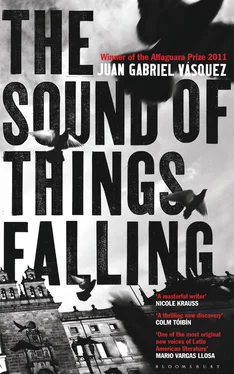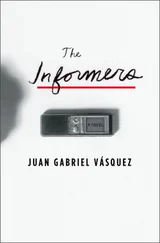‘That’s when we knew,’ said Maya, ‘that the war was against us too. Or that was the confirmation, at least. Beyond any doubt. There’d been other bombs in public places, of course, but they’d seemed like accidents, I don’t know if the same thing happened to you. Well, I’m not entirely sure accidents is the right word either. Things that happen to people with bad luck. The plane was different. It was the same deep down, but for some reason it seemed different to me, as if they’d changed the rules of the game. I’d started university that year. Agronomy, I was going to study agronomy, I suppose I was already sure that I was going to reclaim the house in La Dorada. The fact is I’d started university. And it took me the whole year to notice.’
‘Notice what?’
‘The fear. Or rather, that this thing I got in my stomach, the occasional faint feelings, the irritation, weren’t the typical symptoms of first-year jitters, but pure fear. And Mom was scared too, of course, maybe even more than I was. And then came the rest, the other attacks, the other bombs. The DAS one with its hundred dead. That one at the shopping mall with fifteen. Then the other shopping mall with however many there were. A special time, no? Not knowing when it might be your turn. Worrying when someone who was supposed to arrive wasn’t there. Always knowing where the closest pay phone is to let someone know you’re OK. If there were no pay phones, knowing that anybody would lend you their phone, all you had to do was knock on a door. Living like that, always with the possibility that people close to us might be killed, always having to reassure our loved ones so they don’t think we are among the dead. Our lives were conducted inside houses, remember. We avoided public places. Friends’ houses, friends of friends, houses of distant acquaintances, any house was better than a public place. Well, I don’t know if you know what I mean. Maybe in our house it was different. We were two women on our own, after all. Maybe it wasn’t like that for you.’
‘It was exactly like that,’ I said.
She turned to look at me. ‘Really?’
‘Really.’
‘So you understand me then,’ said Maya.
And I said a couple of words whose scope I didn’t manage to fully determine: ‘I understand you perfectly.’
The landscape repeated itself around us, green plains with grey mountains in the background, like a Gonzalo Ariza painting. My arm stretched along the back of the front seat, which in those models is bulky and undivided, so you feel like you’re sitting on a sofa. With the shifting breezes and the rolling of the Nissan, sometimes Maya’s hair brushed my hand, brushed the skin of my hand, and I liked the sensation and looked forward to it from then on. We left the straight line of cattle ranches with their drinking troughs with roofs and armies of cows lying around the trunks of the acacias. We passed over the Negrito River, a stream of dark waters and dirty banks, with clouds of foam sparkling here and there, the remains of the accumulated contamination from villages and towns upstream where they dumped their waste water into the same water in which they washed their clothes. When we got to the toll booth and the Nissan came to a stop, the sudden absence of air circulating raised the temperature inside the vehicle, and I felt — in my armpits, but also on my nose and under my eyes — that I was beginning to sweat. And when we got back in motion, as we approached another bridge over the Magdalena, Maya began to tell me about her mother, about what happened with her mother at the end of 1989. I was looking at the river beyond the bridge’s yellow railings, looking at the little sandy islands that soon, when the rainy season arrived, would be covered by brown water, and meanwhile Maya was telling me about the evening when she came home from university and found Elaine Fritts in the bathroom, so drunk she’d almost passed out and clutching the toilet bowl as if it might be leaving at any moment. ‘My baby,’ she said to Maya, ‘my baby’s home. My little girl is big now. My little girl is a big girl.’ Maya picked her up as best she could and put her to bed and stayed with her, watching her sleep and touching her forehead every once in a while; she made her a herbal tea at two in the morning; put a bottle of water on the bedside table and brought her two painkillers for her hangover; and at the end of the night heard her say that she couldn’t take it any more, that she’d tried but she couldn’t do it any longer, that Maya was a grown-up now and could make her own decisions just as she’d made hers. And six days later she boarded a plane and returned home to Jacksonville, Florida, to the same house she’d left twenty years earlier with a single idea in her head: to be a Peace Corps volunteer in Colombia. To have an enriching experience, leave her mark, do her bit, small as it might be. All those things.
‘The country changed on her,’ said Maya. ‘She arrived in a place and twenty years later she no longer recognized it. There is a letter that’s always fascinated me, it’s from late 1969, one of the first. My mother says that Bogotá is a boring city. She doesn’t know how long she can live in a place where nothing ever happens.’
‘Where nothing ever happens.’
‘Yeah,’ said Maya. ‘Where nothing ever happens.’
‘Jacksonville,’ I said. ‘Where’s that?’
‘North of Miami, way north. I only know from seeing it on maps, because I’ve never been. I’ve never been to the States.’
‘Why didn’t you go with her?’
‘I don’t know. I was eighteen,’ Maya told me. ‘At that age life’s just starting, you’re only just discovering it. I didn’t want to leave my friends, I’d just started seeing someone. . It’s funny because as soon as Mom left I realized Bogotá was not for me. One thing led to another, as they say in movies, and here I am, Antonio. Here I am. Twenty-eight years old, alone and single, all my body parts still in good working order and living alone with my bees. Here I am. Melting in the heat and taking a stranger to see a dead Mafioso’s zoo.’
‘A stranger,’ I repeated.
Maya shrugged and said something that didn’t mean anything.
‘Well, no, but anyway.’
When we got to the Hacienda Nápoles the sky had begun to cloud over and the air was sweltering. It would soon rain. The name of the property was painted in now peeling letters on the arch of the unnecessarily huge white gate — an eighteen-wheeler could easily have driven through — and on the crossbeam, precariously balanced, was a light aircraft, white and blue like the gate: it was the Piper that Escobar used during the early years and to which, he used to say, he owed his wealth. Passing beneath that plane, reading the registration number stencilled on the underside of the wing, was like entering a timeless world. Time, however, was present. To be more precise: it had wreaked havoc. Since 1993, when Escobar was shot dead on a Medellín rooftop, the property had gone into a vertiginous decline, and that, above all, was what Maya and I saw as the Nissan advanced along the paved track between the fields of lemon trees. There were no cattle grazing in these meadows, which, among other things, explained why the grass was so long. The weeds were devouring the wooden posts. That’s what I was staring at, the wooden posts, when I saw the first dinosaurs.
They were what I’d liked most on my first long-ago visit. Escobar had ordered their construction for his children, a tyrannosaurus and a brontosaurus built to scale, a friendly-looking mammoth (grey and bearded like a tired grandfather) and even a pterodactyl floating over the pond with an anachronistic snake in its talons. Now their bodies were crumbling into bits, and there was something very sad and perhaps somewhat indecent in the vision of those cement-and-iron structures out in the open. The pond itself had turned into a lifeless puddle, or at least that’s what it looked like from the path. After leaving the Nissan on a patch of neglected land, in front of a wire fence that might once have been electrified, Maya and I began to walk through the same places we had gone through in a car years ago, as children, almost teenagers, who didn’t yet understand very well what the owner of all that did for a living or why their parents wouldn’t allow them such innocent fun. ‘Back then you weren’t allowed to walk, remember? Nobody got out of their car.’
Читать дальше












